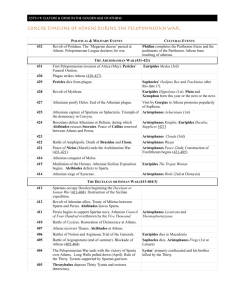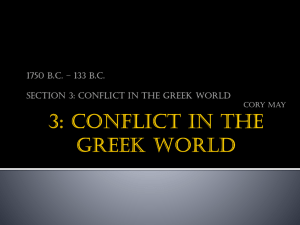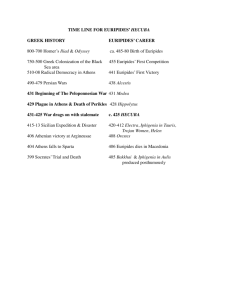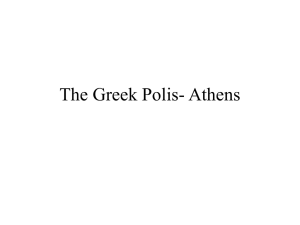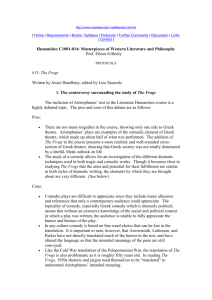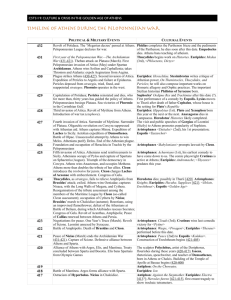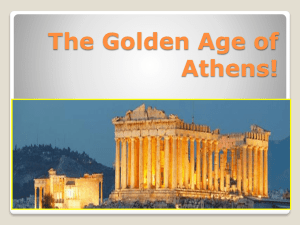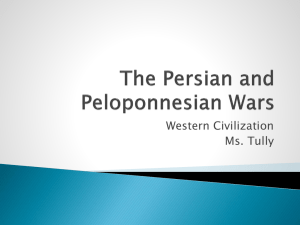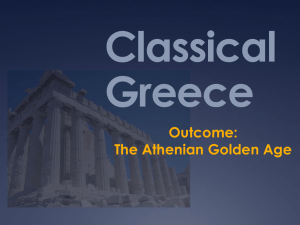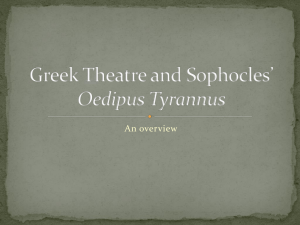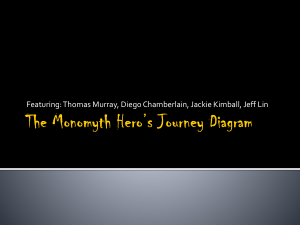PowerPoint - Missouri State University
advertisement
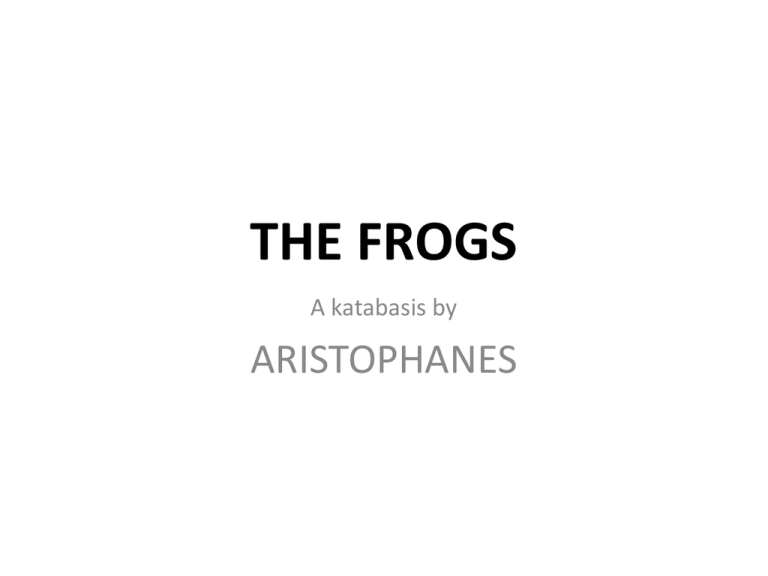
THE FROGS A katabasis by ARISTOPHANES ATHENS DEMOCRACY Greece was usually ruled by kings or tyrants. Not all of them were totally bad, but still… Democracy (rule of the demos) gradually developed in Athens after 600 BC. Citizenship was determined not by family but by districts called “demes.” Military-trained adult males could vote. Far more opportunities for citizen participation than today. Anyone can propose a law, start a trial, attend assembly or not. ATHENS VS. SPARTA The Peloponnesian War between the empires of Athens and Sparta lasted from 431 to 404 BC. There were truces from time to time, but the suffering was terrible. The ambitious Athenian attack on Sicily of 415 BC was doomed by the defection of its commander, Alcibiades. The Athenian forces were destroyed within two years. The Spartans had the upper hand for the rest of the war, and eventually conquered Athens. A TIGHT SPOT The year is 405 BC. The ancient Greek city of Athens is in a tight spot. The Peloponnesian War is going very badly for Athens. The Spartans have just defeated them (406) in the naval battle of Arginusae. They are now just about up to the gates of Athens. Within the next year Spartans will be roaming the streets of Athens, trying to turn it into a parking lot. None of this is any secret. The Athenians desperately need… a laugh. ARISTOPHANES Aristophanes (448 BC-388 BC) , the Greek comedic playwright, was the funniest human being who ever lived. But he did more than just make people laugh. He considered himself a teacher (didaskalos) of his Athenian audiences, commenting upon and forcing them to think seriously about – gulp! – public affairs issues. In The Frogs, Aristophanes takes up two important points: 1) the importance of Arts and Humanities to public life, and 2) ethical leadership. HVMANITIES The humanities are disciplines which study the human condition – that is, those behaviors and traits which distinguish us from the animals. The Humanities seldom yield the intellectual certainty or the financial benefits which other majors across campus can promise. Still, we humans cannot become what we dream of becoming unless we already know who and what we already are, which is impossible without the knowledge of who and what we have already been. ARTS The humanities cannot be explored through scholarship alone. Sometimes the Humanities have to be sung, or danced, or painted or sculpted – or some combination of the above. We will see that Athens does not so much need a professor as it needs a tragic playwright who can give the Athenian people the spiritual strength they will need for the exceedingly difficult times in Athens’s immediate future. Even Aristophanes himself can’t find much to laugh about in that picture. GREEK THEATER ORIGINS OF DRAMA The ancient Greeks hardly invented drama. But their version grew out of performing choral odes, or comedic improvisation. Gradually, the ‘hypocrites’ or actor took precedence over the singing and dancing and joking. The odes and freelance joking and exuberant dancing took second place to concerns such as plot, character, and didactic messages from the author. The serious branch became tragedy and the less serious branch became comedy. DEARLY BELOVED We are gathered here today To get through this thing called life Electric word life It means forever and that's a mighty long time But I'm here to tell U There's something else The after world A world of never ending happiness U can always see the sun, day or night GREEK THEATER Poet AS TEACHER Comedic and tragic poets composed plays both to entertain and to inform their audiences. Sometimes the dramas spoke exclusively to issues of private life – such as Euripides’s Phaedra, which explores the theme of female sexual desire. Most often, though, the drama touches on one or another aspect of… wait for it… PUBLIC AFFAIRS. TEACHER AS POET COMEDY Rightly judged the lesser of the two dramatic arts. It’s so easy to laugh, it’s so easy to hate. It takes guts to be gentle and kind. Laughter is in itself an invaluable defense mechanism but one can not construct an actual value system on jokes and general buffoonery. As much as the DYT personally adores jokes and general buffoonery. By demanding a tragic poet, Aristophanes implicitly acknowledges his limitations as a teacher of the Athenian people. TRAGEDY Tragedy is drama about human beings being forced to make life changing decisions based on incomplete information which they are bound to misinterpret anyway, seeing that they are only human beings equipped with human brains. The ancient Greeks did not invent situations like this. They just developed a dramatic form which handled these situations so well that everything that came afterward was more or less a refinement. DIONYSUS DIONYSUS Dionysus is an unlikely Greek god; both son and daughter of Zeus and just about always drunk. He is also somewhat of what we would today call a “gender-bender.” But he is also connected with his own mystery religion, as well as with Athens’s dramatic festivals. More than any other Greek god, he can be a figure of ridicule, as he is in the Frogs. But as Euripides shows in the Bacchae, he is also a powerful deity who is very jealous of his personal honor. HERACLES HERACLES HERACLES Heracles (or Hercules) is the Greco-Roman world’s equivalent of the great Chuck Norris. He is such a bad ass that it is, literally, funny. His own katabasis involved him going down to Hades and stealing the three headed dog Cerberus. His other adventures there are pretty much Aristophanes’s inventions. But at the same time, they are quite believable. He is pretty much a dramatic foil for his delicate half brother. KATABASIS This play is very much a katabasis story. Dionysus must descend, have a liminal experience, work with a guide, experience what happens in the afterlife, and acquire wisdom. Like Gilgamesh, Dionysus becomes a culture hero and acquires the coveted Community Engagement badge by sharing with the people what he has learned. In this case, it is by first selecting and then bringing back to Athens the tragedic poet it needs in this tragic time – Aeschylus. AESCHYLUS AESCHYLVS Old-school tragedian who believed that Zeus really was the sole source of justice on earth. Loved big long words and characters who just stood around and talked. Humans are always far, far inferior to the gods and should always know their place. Women and barbarians should know their places too. Very skeptical of anything new or innovative and very resistant to change. AESCHYLVS How the Achaeans’ twin-throned power, youth of Greece— Tophlatto-thratto-phlilatto-thrat— sent by the Sphinx, presiding she dog of unlucky days— Tophlatto-thratto-phlilatto-thrat— swooping bird with spear and with avenging hand— Tophlatto-thratto-phlilatto-thrat— granting eager sky-diving dogs to light upon— Tophlatto-thratto-phlilatto-thrat— the allied force assembled to assault great Ajax— Tophlatto-thratto-phlilatto-thrat. EURIPIDES EURIPIDES New-wave, trendy, hipster tragedic poet. Interested in new ideas like philosophy and rhetoric. Wants to portray people and even gods and even women as they really are, and is always willing to take chances. He portrays the gods as powerful but ultimately flawed human beings who cause more hurt because of their divinity. Very scornful of old codgers like Aeschylus and their old school approach to modern problems. EURIPIDES You chattering kingfishers in the sea in the ever-flowing waves who wet wing-tops with water drops like so much dripping dew, and spiders underneath the roof, your fingers wi-i-i-i-i-i-i-i-inding threads for stretching on the loom, work of tuneful weaving rods, where dolphins, those flute-loving fish, leap at the blue-peaked prows, at oracles and stadiums. I joy in early budding vines, the spiral cluster, killing pain. Oh my child, hurl your arms about me . . . You see this foot? TOPOLOGY • • • • • • • Liminal experience Body of putrid water Bad sights and smells Surly boatman Charon Cerberus the doggy, Aeacus the judge Other monsters like Empusa Happy and unhappy campers Empusa AEACUS Oh you abominable, you shameless reckless wretch— villain, villain, damned smiling villain— the man who made off with Cerberus my dog! You grabbed him by the throat and throttled him, then took off on the run, while I stood guard. Now you’re caught—black-hearted Stygian rocks, and blood-dripping peaks of Acheron will hold you down. Roaming hounds of Cocytus will gnaw your guts to bits—Echnida, too, and she’s a hundred heads. The Tartesian eel will chew your lungs, your kidneys bleed from entrails Tithrasian Gorgons rip apart. I’ll set out hot foot in their direction. FINAL CHORUS This city, it often seems to me treats our best and worthiest citizens the way it does our old silver coins, our new gold ones, as well. This money was never counterfeit—no, these coins appeared to be the finest coins of all, the only ones which bore the proper stamp. Everywhere among barbarians and Greeks they stood the test. But these we do not use. Instead we have our debased coins of bronze, poorly struck some days ago or yesterday. THE BIG QVESTION Therefore, whichever one of you will give our state the best advice, well, that’s the man I’ll take. So first, a question for each one of you— What’s your view of Alcibiades? This issue plagues our city… What do they think? The city yearns for him, but hates him, too, yet wants him back. But you two, tell me this— what’s your sense of him? ALCIBIADES ALCIBIADES Alcibiades was a close friend of Socrates. When commanding the Sicilian Expedition in 415 BC, he had a herm-breaking party on the evening of departure. As a result, he defected to the Spartan side with all the Athenians’ plans. After getting the King of Sparta’s wife pregnant, he moved to Persia, where he prepared an invasion force against Athens. After a government change in 411 BC, Alcibiades was recalled to Athens, but he did not arrive until 407. He fought a couple of victorious land battles, but he lost the naval battle of Notium in 406. Afterward, he went into self-imposed exile. PELOPONNESIAN WAR PELOPONNESIAN WAR, THE EVRIPIDES I hate a citizen who helps his native land by seeming slow, but then will quickly inflict injuries which profit him but give our city nothing. AESCHYLUS The wisest thing is not to rear a lion cub inside the city, but if that's what the citizens have done, we must adjust ourselves to fit its ways. EURIPIDES If we removed our trust from politicians on whom we now rely, and used the ones we don’t use now, we could be saved. It’s clear we’re not doing well with what we’re doing now, if we reversed our course, we might be saved. THE WINNER CONGRATULATIONS Blest is the man with keen intelligence— We learn this truth in many ways Once he’s shown his own good sense he goes back home again. He brings our citizens good things as well as family and friends, with his perceptive mind, So to be truly civilized, don’t sit by Socrates and chat or cast the Muses’ work aside, forgetting the most vital skills of writing tragedies. Wasting time with pompous words, while idly scratching verbal bits— that suits a man who’s lost his wits! FAREWELL FROM HADES So now, farewell, Aeschylus—go, save our city with your noble thoughts, and educate our fools—we have so many. Take this sword, hand it to Cleophon. Present this rope to tax collector Myrmex and his colleague Nicomachos— this hemlock give to Archenomos. Tell them to come here fast without delay. THAT’S ALL! First, all you spirits underneath the ground, let’s bid our poet here a fond farewell, as he goes upward to the light. To the city grant worthy thoughts of every excellence. Then we could put an end to our great pain, the harmful clash of arms Let Cleophon— and all those keen to fight—war on their enemy in their ancestral fields, on their own property.
